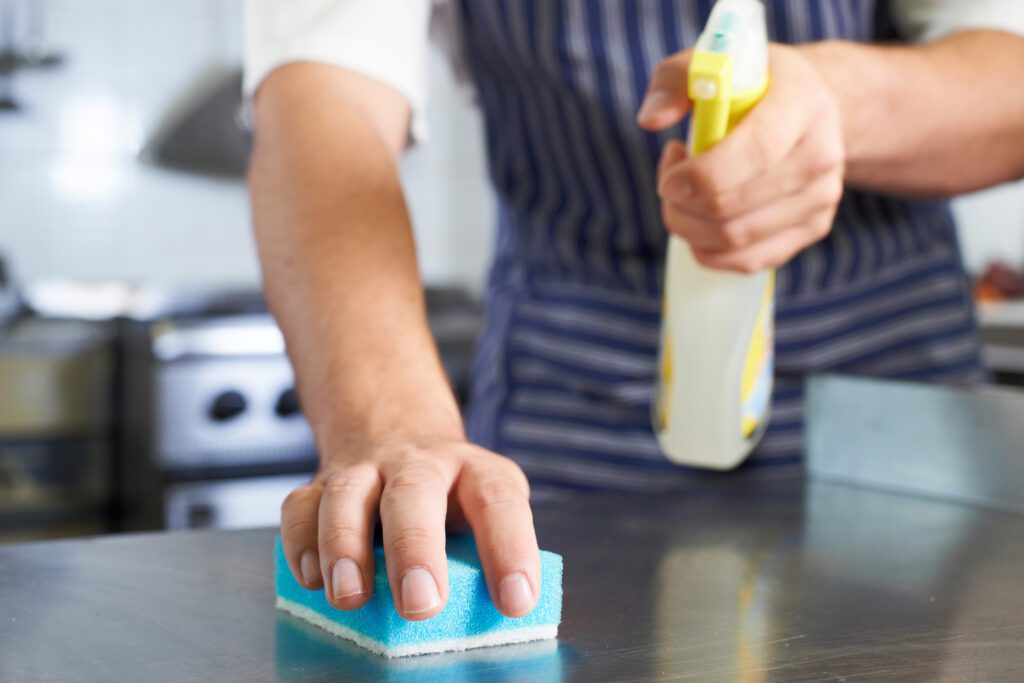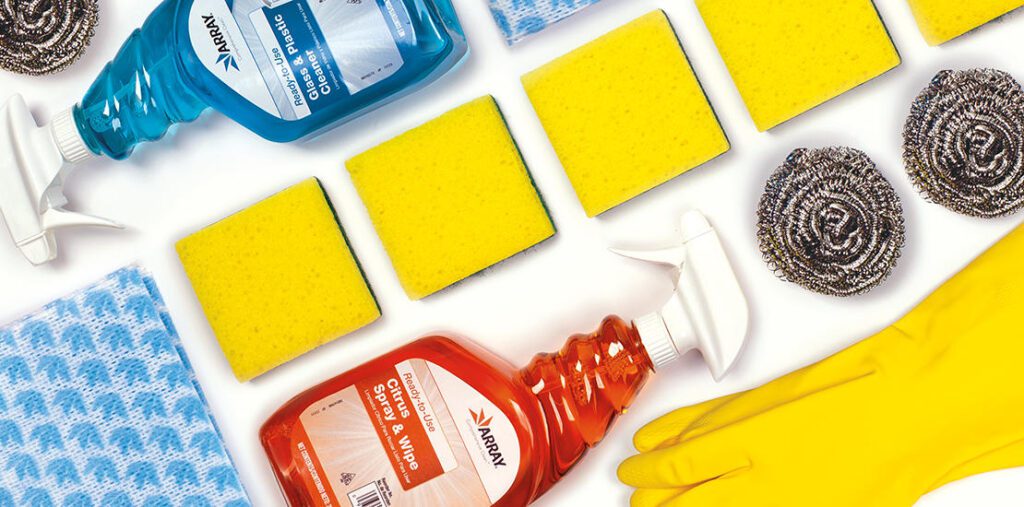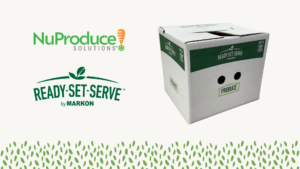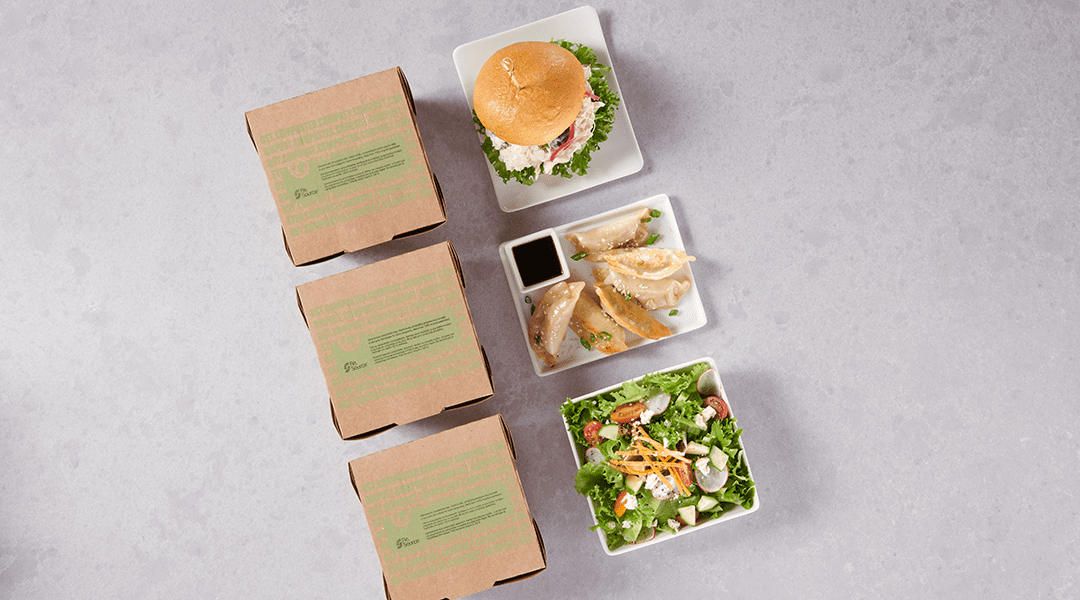An ounce of prevention is worth a pound of cure. When it comes to cleaning and sanitation at your hospital or care community, a small amount of the right cleaning solution is an affordable way to stop the spread of germs, bacteria and infectious diseases before they become a problem.
Cleaning products come into play in all parts of your healthcare operation, from dish cleaning to kitchen cleaning, floor care, hand hygiene and even laundry. The products you use are among your best defenses when it comes to maintaining safety.
Hospitals and senior living organizations spend about 10 percent of their foodservice budget on cleaning supplies. While that expense seems daunting, the price of an outbreak can be devastating. You can’t afford to risk the health of your patients, residents, employees and the public, let alone ignore potential financial liabilities and harm to your reputation. But there are economical ways to maintain a clean, safe operation.
“If you use the right chemical for the job and look at the use-cost of each chemical, your costs are cheaper than you might think,” says Stephen Saunders, a Gordon Food Service Chemical & Beverage Category Analyst.

No Two Operations are Alike
To help understand the true cost of chemicals, Saunders created a tool your Sales Representative or Chemical & Beverage Specialist can use to find the right product and calculate per-use cost breakdowns.
Often the best cost savings come from using dispensed products, a blend of chemicals and water in the right proportion. Saunders points out that it’s almost always a more cost-effective solution than ready-to-use, national-branded products.
There’s convenience with buying a ready-made bottle of glass cleaner, he notes. But the cost of those products can be quadruple the cost of a dispensed chemical solution. Plus, the ready-to-use formula may be too weak or too strong for your cleaning needs.
Every operation has different needs. It’s important to consider these factors:
- What soils are you trying to clean?
- What is the quality of the water?
- What is the surface you’re cleaning?
- What is the effective rate of a sanitizer?
All of these matter. Greasy soils require a stronger alkaline detergent. Chemicals used with soft water are dramatically different than chemicals needed with hard water to be effective. Using the wrong chemical mix in floor care can damage a surface. The wrong product used to spray tables and other surfaces won’t kill germs and contaminants.
These unique situations make it important to work with experts on training and procedures, Saunders advises. Dish washers need to know how long dishes should soak. Housekeepers shouldn’t wipe off sanitizers before they can do their job. An expert will not only provide training and advice, but also adjust formulas so you’re using exactly what’s needed.
“We hate the glug method for using chemicals or detergents,” he says. “Free-pouring leads to overuse by employees who believe that because a certain amount works well, a larger amount will work better. With most chemicals, there is a point at which you’re just wasting money and the results will get worse.”
Breaking Down the Cleaning Needs
Here is Saunders’ advice for many areas important to healthcare cleaning and safety:
Dishwashing. Consider adjusting the time rather than the detergent in your low- or high-temperature dish machine. Going from 60 seconds to 90 gives chemicals more time to work. Typically, he says, if anything needs adjusting it’s a rinse additive to help water sheet off faster. This is especially useful for getting spot-free glassware.
Three-compartment sinks. Free-pouring detergent is costly. Saunders has seen operators realize significant savings by using a dispenser that provides the right amount every time. Free-pouring bleach can be risky—it’s corrosive and can react with other chemicals. It’s safer to use a quaternary sanitizer.
Kitchen cleaners. Chemical needs differ by surface. Metals, stone, tile and grout require different products. Without an expert’s advice, Saunders warns, you’re likely to have increased labor costs and people adding unneeded and ineffective chemicals in an attempt to succeed. The incorrect chemical at the inappropriate dilution means wasting money on chemicals and potentially jeopardizing health and safety with ineffective cleaning.
Floor care. A single product for all floors is rarely the right solution, so expert advice works best here as well. In the kitchen there can be lots of grease, which calls for a no-rinse enzyme cleaner. These are good for tile and grout, but not for sealed concrete. Outside the kitchen, cleaners with acids might be necessary for stone floors. Using the wrong cleaner could result in slick or sticky spots, increasing the risk of falls. Products used improperly also can attract more dirt, resulting in more-frequent cleaning.
Hand hygiene. Product efficacy rates are different, so not all hand sanitizers are alike. The amount of uses you get out of some hand sanitizers and soaps will be higher than others. To get the results best for your operation, read the spec sheets to see how they are rated for killing bacteria and germs.
Laundry. Because every chemical works differently, Saunders points to controlling the wash cycle as a way to save money and achieve the best cleaning results. Manufacturer settings often fill to the high-water line, resulting in the addition of more chemicals using expensive hot water. A support person can program a machine to maximize chemical and water efficiency.
Housekeeping. There are dispensed options for almost every cleaning need, which are more cost-effective in the long run than ready-to-use products. With a dispenser, you get the right cleaning mixture for the job in every bottle. With a ready-to-use glass cleaner, for example, you may be using too much chemical for the job, which is a waste. Too little chemical won’t kill germs, so you’re just spreading them around tables, countertops or other surfaces.
Your Chemical Expert Can Help
In healthcare, Saunders notes, understanding how chemicals work and having proper training is vital to preventing the spread of germs. When you’re working among a population that may be more vulnerable to infection, doing all you can to achieve cleanliness and sanitation is in your best interest.
Foodservice managers spend their time focused on running the kitchen, but many also are tasked with overseeing cleaning needs. Because it’s not part of the manager’s primary role, Saunders emphasizes the need to consult with chemical experts on products and equipment.
Explore our high-quality selection of effective cleaners, sanitizers, degreasers, and more to help your operation reduce the risk of jeopardizing the health and safety of your customers and team members today!




























